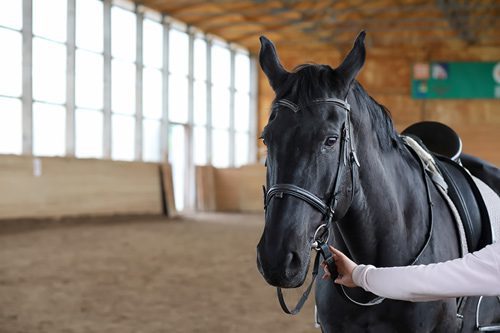Equine therapy, a form of experiential therapy, has numerous benefits for those in recovery from drug and alcohol addiction. Once known as equine-assisted psychotherapy, it is also referred to as horse therapy or horse-assisted therapy.
What Is Equine Therapy?
Equine therapy involves the client interacting with the horse by touching, grooming, leading, petting, feeding, and caring for it. The session is supervised by a trained therapist, and in most instances, an equine specialist. Horses can mirror and reveal a person’s emotions. They do this without any judgment. For example, if the person is timid, the horse will be timid. If the person is energetic, the horse will be energetic.
Horses are very in tune with humans. They can hear the human heartbeat from a distance of four feet and synchronize their heartbeat to that of the person. When a horse is introduced to a person, it senses the emotional and physical responses causing their behavior. It then responds to the person in the same way. The horse’s behavior helps the therapist learn more about the behavioral patterns and mindset of the person in therapy.
Equine Therapy for Addiction
Equine therapy is successful in treating addiction and co-occurring disorders. A co-occurring condition, also known as a dual diagnosis, occurs when an individual struggles with addiction and another mental health condition, such as depression or PTSD.
Building Trust & Relationship Skills
As the relationship between the individual and the horse grows, so does trust. Because of the horse’s deep sensitivity to the person they are working with, when the person interacts with them, it is very similar to how they would interact with another person. Building trust with a horse takes time and work. It helps improve many of the person’s relationship-building skills, such as balancing internal emotions, connection, focus, and non-verbal communication. Equine therapy also increases the person’s confidence, self-esteem, and self-respect.
Additional relationship-building skills equine therapy improves includes:
- Positive emotional growth
- Increased understanding of boundaries
- Resilience
- Learning how to let go of negative emotions
- Assertiveness
- Mindfulness and relaxation
- Feedback and Mirroring Help Develop Self-awareness
Horses observe everything very closely and are very sensitive to emotion and movement. When they mirror a person’s emotions or behaviors, they convey a connection and a sense of understanding to the person, making them feel safe. It also helps the person become more self-aware as they use the horse’s behavior as feedback. The interaction between the two allows the person to be aware and mindful of what is occurring at that moment. As they gain insight into how their emotions and behaviors affect others, they can begin working on changing their behaviors and attitudes for the better.
Avoid Isolation & Understand Responsibility
It is critical in addiction recovery to avoid isolation and build healthy relationships and a solid support system. Isolation or maintaining unhealthy relationships often leads to relapse. Equine therapy helps those in recovery learn how to build healthy relationships and understand responsibility. By taking care of the horse’s needs, the person learns the importance of accepting responsibility. It helps them adjust to routines, follow guidelines, learn patience, and gain a sense of pride.
Reduce Feelings of Vulnerability
Equine therapy is helpful for anyone who has feelings of vulnerability and anxiety. The person learns how to try new things as they interact with the horse. They overcome their fears and challenges as they step out of their comfort zone in a safe environment. They then can process the entire experience. Talking to their therapist about their discoveries, insights, victories, challenges, and fears helps them feel less vulnerable.
Do You Need Help?
If you or a loved one struggles with a drug or alcohol addiction, you are not alone. Help is available. At Canyon Vista Recovery Center, located in Mesa, Arizona, our caring professional staff will help you gain the valuable tools you need to travel the path to recovery. Using a combination of medical, psychiatric, clinical, and holistic approaches, we can help you gain new life skills and begin to repair the damage caused by addiction. In addition to equine therapy, Canyon Vista provides family healing, nutritional therapy, 12-Step recovery, and ongoing support.





